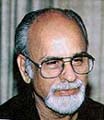Commentary/Vir Sanghvi
The leadership of India cannot be a race in which the hares decide to give the gold medal to the
tortoise
 The job went to H D Deve Gowda, a little known figure
outside his native Karnataka, who commanded the loyalty of a grand
total of 12 MPs (some of those were even trying to keep R
K Hegde happy at the same time).
The job went to H D Deve Gowda, a little known figure
outside his native Karnataka, who commanded the loyalty of a grand
total of 12 MPs (some of those were even trying to keep R
K Hegde happy at the same time).
But by then the principle was firmly established.
When you looked for a prime minister, you did not look for positive
qualities. You looked for an absence of negatives.
Deve Gowda may have been a homely sort of fellow
whose approach to every problem was to handle it as he would have
in his Karnataka days, but he posed no threat to anybody. He had
no national base and seemed in no danger of being able to create
one. He entered Race Course Road as a man from nowhere. And at
the end of ten months he returned to nowhere.
When the time came to choose Deve Gowda's successor,
exactly the same logic applied. Mulayam Singh Yadav was out because
he posed a threat to Laloo Yadav and vice versa. Chandra Shekhar
was out because he was too strong a personality. Ram Vilas Paswan
was out because the other Harijan-backward leaders did not want
him to outshine them. Chandrababu Naidu was out because M Karunanidhi
did not want another leader from the south to get the job. And
so on.
Finally, it boiled down to three candidates: S R
Bommai, Inder Gujral and G K Moopanar.
Of the three, Moopanar was the most politically-substantial
figure. Naturally this ruled him out. Neither Chandrababu nor
Karunanidhi wanted a south Indian at Race Course Road. And Harkishan
Singh Surjeet, in his new avatar as the Red Rasputin of the United
Front, was concerned that Moopanar would not listen to him.
 That left Gujral and Bommai. By the end, Laloo Yadav
was a fervent supporter of Bommai's candidature. When you consider
that Bommai's Hindi is of the same calibre as Laloo's English,
you recognise how much of communication gap there must have been.
And yet Bommai was Laloo's choice; not because he was any good
but because he posed no threat.
That left Gujral and Bommai. By the end, Laloo Yadav
was a fervent supporter of Bommai's candidature. When you consider
that Bommai's Hindi is of the same calibre as Laloo's English,
you recognise how much of communication gap there must have been.
And yet Bommai was Laloo's choice; not because he was any good
but because he posed no threat.
Fortunately, Laloo did not get his way. And the eventual
choice, Inder Gujral, a good man with both experience and goodwill
on his side.
My intention this week is not to berate Inder Gujral.
He deserves a chance. And who knows? In 1991, a 70-year-old former
foreign minister got a job nobody expected him to but still managed
to change the face of India. In 1997, a 77-year-old former foreign
minister might still manage to repeat Narasimha Rao's success
as prime minister.
My point is this: Is it enough for us to just hope
and pray that by an accident of destiny the right man has got
the job?
Isn't it time we stopped choosing our prime ministers
on the basis of their inoffensiveness? There is something seriously
wrong with a country where S R Bommai comes within a whisker of
the prime ministership. And the leadership of India cannot be
a race in which the hares decide to give the gold medal to the
tortoise.
 Part of the problem is the lack of inner-party democracy.
Mulayam Singh's supporters say he had 103 votes and could have
been elected leader of the United Front in a free and fair election.
Perhaps they are exaggerating. But the only way to find out is
to test these claims. And the only way to do that is through an
election.
Part of the problem is the lack of inner-party democracy.
Mulayam Singh's supporters say he had 103 votes and could have
been elected leader of the United Front in a free and fair election.
Perhaps they are exaggerating. But the only way to find out is
to test these claims. And the only way to do that is through an
election.
You need men of competence and vision to run India.
Our prime ministers need dynamism and charisma. If we are led
by the lowest common denominator then that is where we will remain
in the community of nations: at the lowest level, without any
hope of catching up with the rest of the world.
Tell us what you think of this column
|





